#shuichi ikeda
Explore tagged Tumblr posts
Text
Anime Spotlight #3: Project A-ko (1986)

Join Ash as she takes a look at an underrated pride month anime classic and formative movie in her journey navigating queerness - it punches way above its weight and is well worth your time. Perhaps the greatest queer anime popcorn flick of all time, Acquired Stardust's spotlight on 1986's Project A-ko is here!
As previously discussed, time and tide can play funny tricks with our memory and perception. To that point, there's a special sort of magic that old media facilitates. Separation from the people and circumstances that produced it goes a long way towards helping us disconnect from preconceived notions and expectations to experience works more at face value. For a brief amount of time the brain is tricked into allowing itself to believe that this ancient work of art exists somehow outside of time and place - apart from not only the underlying political and cultural factors but also the individuals that birthed it.
Project A-ko is a work that synergizes incredibly well with this psychological trick but is perhaps doubly impressive when looked at in its proper context.

Released theatrically in June of 1986 (only a little over a month before Studio Ghibli's first official project Castle in the Sky) and named after Jackie Chan's 1983 Project A, Project A-ko was born out of the staff behind foundational hentai OVA series Cream Lemon deciding to pivot and make a mainstream movie for theaters. Carrying a similar spirit to Project A, Project A-ko is a sci-fi action-comedy that smashes together the absurd and the mundane brilliantly.
Opening with a scene entirely in English (even in the Japanese language version) that sees a spaceship fall to earth and destroy the coastal southern Japanese city of Graviton, we flash forward 16 years to our protagonist (the eponymous A-ko) waking up to walk her friend C-ko to school for their first day. Deeply steeped in Class S tropes that had been popular in anime since the 70s that saw homoromantic relationships between women become somewhat normalized, C-ko catches the eye of rich and elegant classmate B-ko who immediately becomes overwhelmingly (and inexplicably) infatuated by her and deeply jealous of the relationship C-ko shares with A-ko, which stokes a rivalry for the affections of C-ko that gradually becomes more unhinged as the movie rolls on, even managing to slip in an unexpected cameo from an American fast food icon.

It is here, beyond the basic setup, that Project A-ko begins to coalesce into something far better and much more clever than it has any real right to be. The lead characters, at first basic archetypes generically named but actually containing multi-layer puns, are wonderfully self-indulgent, given tons of room to come into their own and become a surprisingly strong ensemble. Gender, gender roles and sexuality are portrayed with a fascinating nonchalance (the likes of which is also featured in anime of the time such as Dirty Pair, as made clear with a very popular post on this very site). Fight choreography is shockingly good for the experience level of all involved (who by this time had mostly been known for their involvement in adapting Rumiko Takahashi's manga Urusei Yatsura).
The soundtrack (also in English and very of its time) matches the tone of the film in the best ways possible and helps to shape the film into something that is all too rare in the world of queer media: positive, happy stories celebrating the love people have for each other without getting too far into the weeds of angst and tragedy that is unfortunately often part and parcel with the real life queer experience. The Japanese voiceover cast features a stellar lineup of actors including Miki Ito, Emi Shinohara, Michie Tomizawa and Shuichi Ikeda (as well as a very early appearance by Megumi Hayashibara), and needless to say they knock it out of the park. One potential pain point is C-ko's loud and obnoxious nature, which despite being a central part of her character is toned down in the English dub. If one finds her to be especially grating, which is one of anime's hallmarks in this era, the English dub is serviceable enough.

Watching Project A-ko was a formative experience for me, with its Goku-esque lead becoming a hero of mine. The final shot of the movie still manages to make me emotional every time I see it. Its simple concept of 'the superheroes and supervillains in your everyday life' is executed wonderfully and the bright-eyed, saccharine tone is an incredible breath of fresh air in contrast to the misery that queerness (and, more often, external reactions to said queerness) often brings about in our lives. There is so much to be said about this movie but as is so often the case with anime spotlights, it's hard to get granular without spoiling the experience and I'd much rather you see it for yourself than have it spoiled for you in what is in all likelihood the first time you're hearing of it.
They say that the best queer media is often accidentally made by straight men who have no idea that they're making queer media and that holds true for Project A-ko, who's character designer/animation director Yuji Moriyama says they simply hadn't put much thought into in that context which is unfortunately believable - although Project A-ko receives several sequels, they get progressively further away from the shockingly refreshing queer love story that is the relatable heart of the movie, contrasting its rising stakes and insanity that culminates with a three-sided battle that once again causes widespread damage to Graviton City.

But such is the beauty of old media - for a brief hour and a half we are able to allow everything but the thing we're watching to fade away. To take it at face value. To see ourselves in these archetypal characters, and to brim with pride as they become engaging characters all their own. To hope that perhaps one day the world will treat queer people with the same sort of complete nonchalance featured in this movie, and to hope that we too may one day be able to have the sort of relationship between A-ko and C-ko in our own lives.
A gem hidden among the stones, Project A-ko is undoubtedly stardust.
-- Ash
#anime#retro anime#80s anime#anime recommendation#old anime#showa era#80s#1986#project a ko#project ako#oldtaku#nostalgia#nostalgic anime#anime spotlights#ash#pride month#pride month 2024#pride#lgbt#wlw#gay anime#lgbt anime#katsuhiko nakajima#nakajima katsuhiko#yuji moriyama#Miki Ito#Miki Itou#Miki Itoh#Michie Tomizawa#Shuichi Ikeda
18 notes
·
View notes
Text
Detective Conan and Mobile Suit Gundam

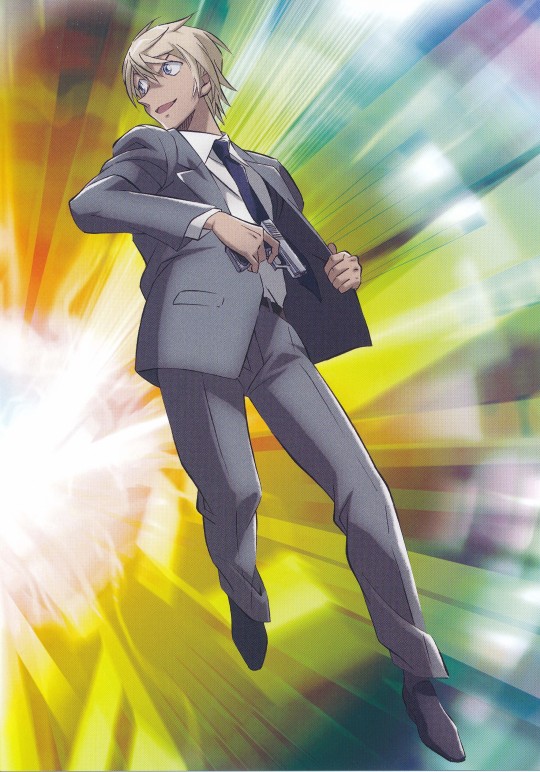
if i had a nickel for every time there were sad anime men named amuro, i'd have two nickels. which isn't a lot but it's weird that it happened twice and they have the same voice actor.
BUT WAIT. THERE'S MORE.


Most of you will of course know that Char Aznable began to go by Quattro Bajeena between 079 and Zeta. It will probably not surprise you to know that his DCMK counterpart did the same thing (after faking his death):


(And you guessed it! Char and Akai are voiced by Shuichi Ikeda!)
Also it's weird that this keeps happening too:
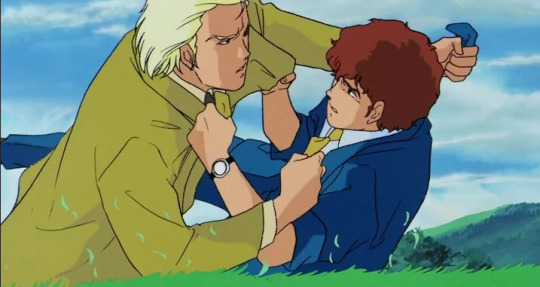

Amuro and Shuuichi fought on top of a roller coaster and it's my favorite movie.
And this is literally the same dynamic:


So WHEN I TELL YOU THAT WATCHING 1000+ EPISODES OF DETECTIVE CONAN WAS WHAT MADE ME WATCH MORE GUNDAM, this is what I mean.
thank you for coming to my TED talk about my brain worms.
#dcmk#mobile suit gundam#gundam#toru furuya#shuichi ikeda#charmuro#zeta gundam#shuichi akai#rei furuya
119 notes
·
View notes
Text
Let's Read: A Requiem for Char: The Red Comet of My Youth - Chapter 3
by Shūichi Ikeda

This post will be an overview of the third chapter, A Man Called Char Aznable. Below are links to the previous chapters.
Chapter 1 | Chapter 2
Ikeda begins this chapter by talking about his experiences with Yoshikazu Yasuhiko. As discussed last time, it was Yas’s art that inspired Ikeda to try out for the role of Char in the first place. Whenever he plays Char, he keeps that original inspiration in mind.
The two first met in person backstage at an award ceremony in 1980. Ikeda was struck by what a kind gentleman Yas was, and to paraphrase, was shocked that such an ordinary person could draw such amazing pictures.
Ikeda briefly mentions that he enjoys Yas’s Gundam: The Origin manga, especially the scenes from Char’s backstory. Looking at the scenes from the military academy and where Char meets Lalah for the first time, Ikeda comments, “If I were a little younger, I'd like to try these lines.” (we now know he got that wish!)

Next, Ikeda discusses how Char disappears from episode 12 - 26 of the anime, and the possibility that Director Tomino considered killing the character off around that time, a rumor he apparently heard from a staff member.
The issue was Tomino trying to figure out what Char’s motivation would be going forward, beyond just his personal goal of revenge against the Zabi family.
When Char reappears in episode 26, he admits that the Gundam is an opponent he wants to defeat with his own hands and that such a thing is childish. Of course, we later learn there's more to it than that.

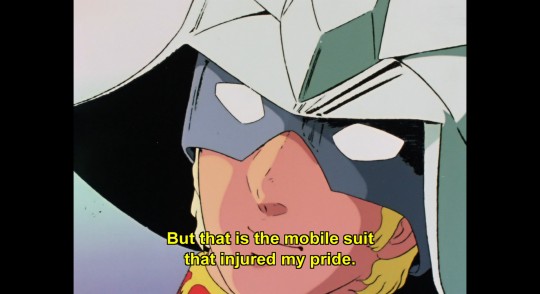
According to Ikeda, in order to bring Char back to the center of the story, Director Tomino invented the concept of "Newtype". This would act as a new motivation for him to go into battle that had not previously been apparent to him.
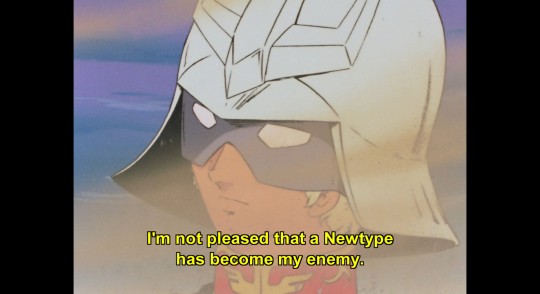
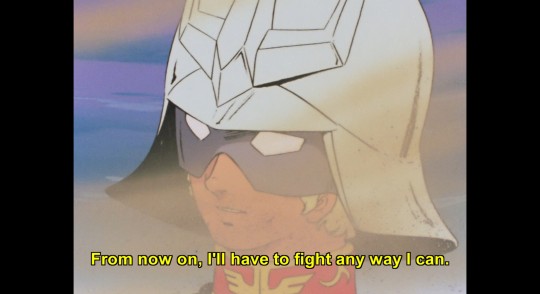
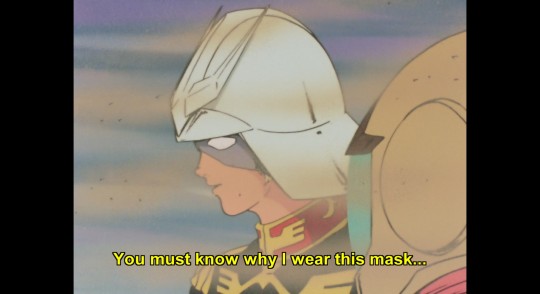
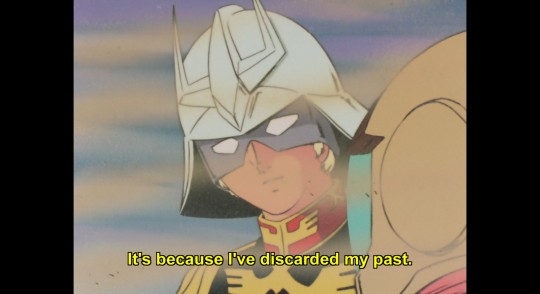
It is with the emergence of Newtypes such as Lalah and Amuro that Char senses the arrival of a new era, and tries to remove Amuro as an obstacle, who is simply being used as a tool of war.
In Ikeda’s words, Char's actions in the latter half of the story are symbolized by this phrase, "overthrowing the Zabi family is an afterthought."


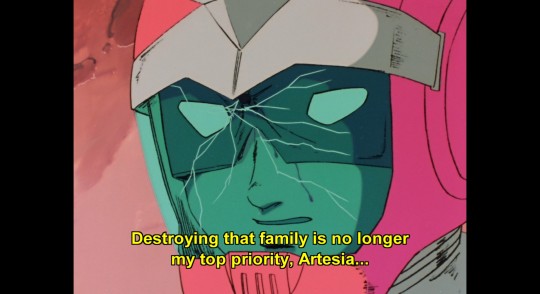
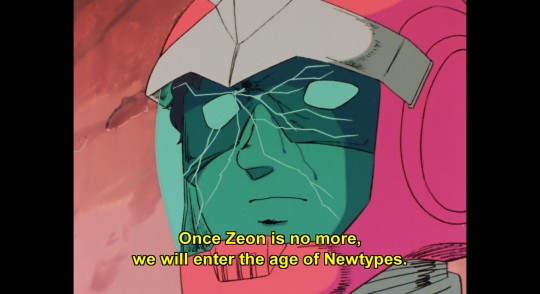
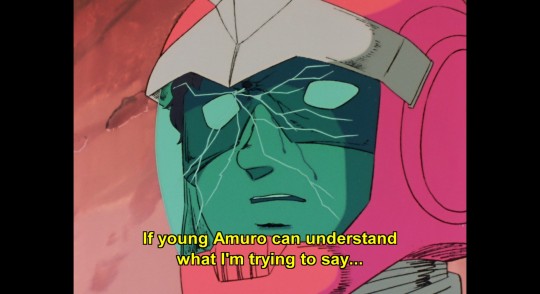

Of course this wasn't an easy task to pull off, but by this point Char had grown to be an indispensable presence in the narrative and drama Director Tomino had been crafting.
Due to the show's early cancellation, Tomino narrowed down the focus of the story to Amuro and Char, and Lalah and Sayla. Ikeda commends him for being able to wrap up the story in such a dramatic and satisfying way despite the circumstances.
Ikeda goes on to talk a little more about Tomino. One aspect he draws attention to is Tomino's unique dialogue (as he calls it, "Tomino-bushi" [富野節]) and innovative camera work. He mentions Gackt likens it to song, with a musical touch.
As mentioned previously, Ikeda has the impression that Tomino allowed him some freedom in the direction he took Char, but believes that they both decided around episode 10.
Ikeda: This is also my imagination, but I think that in the episodes leading up to this point, Director Tomino was trying to figure out who he should project himself onto in his "Gundam" works.
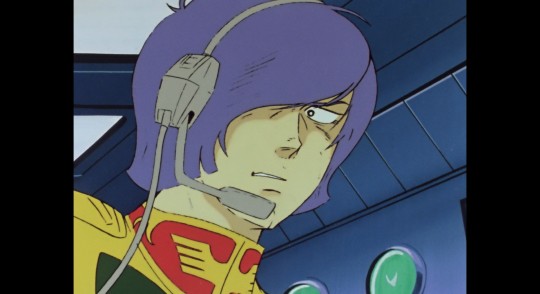

Ikeda: At the moment Char indirectly killed Garma, I think Director Tomino thought, "I've decided on this guy." It seems that the appearance of Director Tomino himself is strongly reflected in Char Aznable.
Another interesting point Ikeda brings up is how while Amuro and Kamille are the main face of First and Zeta, they are often at the mercy of reacting to the situations they are thrown into. By contrast, Char often plays the role of the story's "trigger", the character who creates the situations by having an active attitude towards the world.
Now my personal favorite section of this chapter, why Ikeda thinks Char is so cool. To Ikeda, Char's coolness comes from the fact that he is always "fighting with himself". He's fighting Amuro, the Federation Forces, and the Zabi family, but the most formidable enemy is himself.
Char is a half-hearted existence, both as a new type and as an old type. In other words, like an intermediate existence between “a person who can think digitally and a person who can only think analogously.”
Ikeda: Everyone has their own war of independence within themselves. Beyond the battle with Amuro and the Zabi family, Char sees the battle with himself. A man who casually takes on a lot of things and challenges his own battles, that's why Char is cool.
Compared to a character like Amuro, who is designed to be relatable to the audience, Ikeda believes Char should be higher up, "someone out of reach".
He uses the line "Because he was a spoiled kid" from episode 12 as an example.

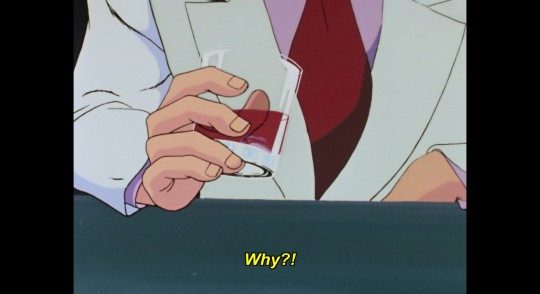
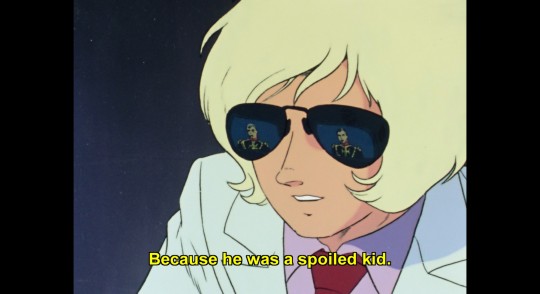
Ikeda: If I had been a seasoned voice actor, I would have been too shy to say the famous line. I guess I was able to do it because it was my first time as a regular in an anime, surrounded by people I didn't know, and in a tense atmosphere where no one said, "That's a smug line."
Even so, there is a moment where Char’s demeanor begins to change in the final episode, when he asks Lalah what he should do. It’s a pivotal moment where the viewer sees this human side of him for the first time.
Char has questioned himself before this moment, but he has never asked a specific person such a thing.

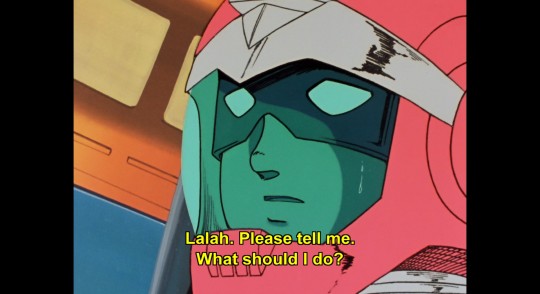
Ikeda: So, at the very end, Char's weakness and frustration as he prayed to Lalah in order to win against Amuro became the key to a deeper understanding of Char for me as an actor.
Finally, Ikeda addresses the question, “do you have any tips for playing Char?”
Ikeda: I answer, "There is no such thing." If I had to say it, it would be "do nothing".
Ikeda: I have already played him for 30 years, so I have "Char Aznable" in my back pocket for sure. So I always feel Char's presence, and although it may be annoying to him, I believe that he and I are one and the same. Hence, I must always be at 100% or more when playing him.
"Come on, you can do better than that, can't you? Why don't you ask to try one more time?"
Ikeda: I feel as if he is telling me to do it. Playing Char has always been a big hurdle for me. Even so, when I play Char, I always feel at ease. It feels like you are having a drink with an old friend, and you feel very relaxed.

Ikeda: For me, Char was both my partner and my teacher as a voice actor.
~
That's all for my summary of chapter 3. Thank you for reading!
34 notes
·
View notes
Text
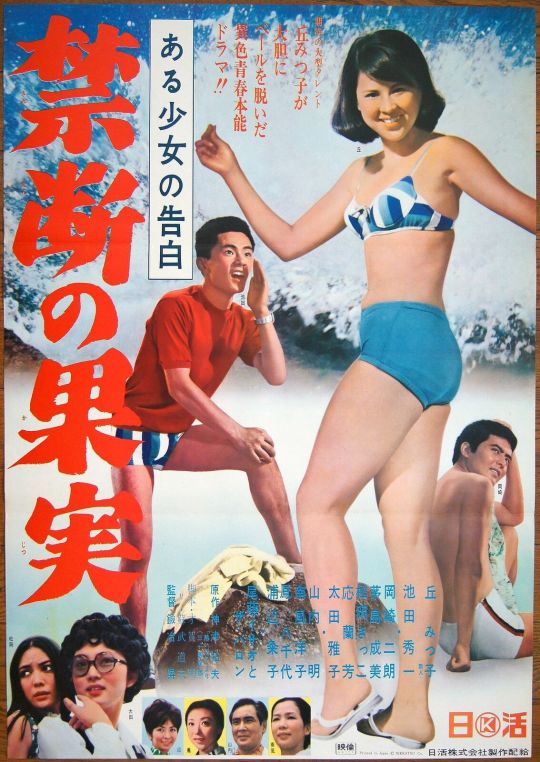
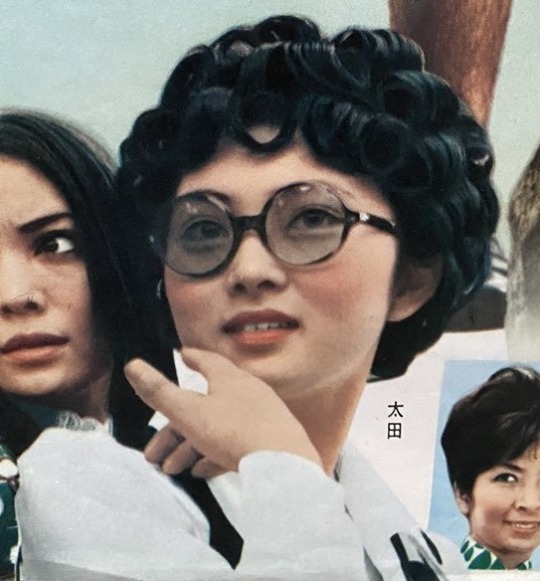
The poster for A Girl's Confession: Forbidden Fruit (ある少女の告白 禁断の果実), 1968, directed by Noboru Kaji (鍛冶昇) and a better look at Meiko Kaji (梶芽衣子) on it.
In addition to Meiko, the film stars:
Mitsuko Oka (丘みつ子) Shuichi Ikeda (池田秀一) Jiro Okazaki (岡崎二朗) Kikko Matsuoka (松岡きっこ)
#Meiko Kaji#梶芽衣子#Masako Ota#太田雅子#Noboru Kaji#Mitsuko Oka#丘みつ子#A Girl's Confession: Forbidden Fruit#ある少女の告白 禁断の果実#杉良太郎#poster#Shuichi Ikeda#池田秀一#Jiro Okazaki#岡崎二朗#Kikko Matsuoka#松岡きっこ
20 notes
·
View notes
Text
I don't know what's wilder to me about the new Arknights robot operator, that the english VA is the Cryptkeeper, or that the Japanese VA is Char Aznable.
That is just wild on both ends to me to get such famous voiceover veterans for such a role. Shame the event that gives you a free copy of the character seems... excessive in terms of high score requirements. I mean, the Rhine Lab enemies are already rough by default, and now this?
11 notes
·
View notes
Text

Every time this man shows up my brain just goes Shanks haha
8 notes
·
View notes
Photo


#riki oh#riki oh 2 child of distruction#satoshi dezaki#bin shimada#ryuuzaburou oomoto#shuichi ikeda#animation#anime
6 notes
·
View notes
Text

Old Shanks Drawings
#one piece#shanks#I realized I have drawn this man more than Luffy 💀💀#I just really liked his red hair#and his va! Ikeda Shuichi! He voices character I love from another series 🖤🖤#will I draw shanks again… idk 🤷#decided to post 2nd old drawing#digital art
32 notes
·
View notes
Text
Talia Gladys stupid af, if I were dating Gilbert “Him” Durandal, I would simply not break up with him.
5 notes
·
View notes
Text
OOOOOh now I know why Lahabrea's japanese VA clicked to my ears, Shuichi Ikeda voiced Akai in detco and Marluxia!
#if I had a penny for every time Shuichi Ikeda voiced a character with a popular ship that got cousin revealed super late i would have TWO#Also I forgot Jouji Nakata voiced characters in XIV and got jumpscared maybe twice#yuyuhase's voice actor isn't listed#pili plays ff14#OH MINFILIA'S VA IS ONE OF THE JAPANESE VA FOR ROBIN FE AWAKENING#THAT WHY IT WAS SO FAMILAR
2 notes
·
View notes
Text
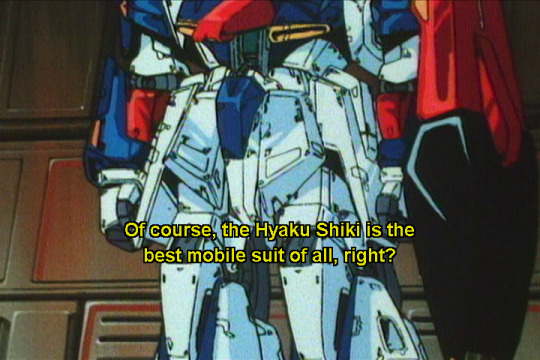

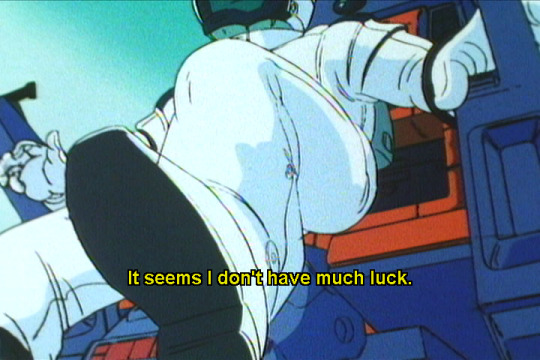
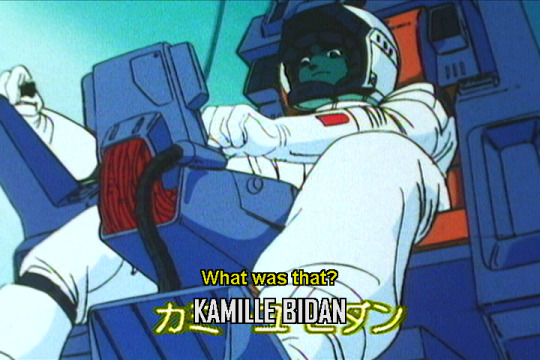
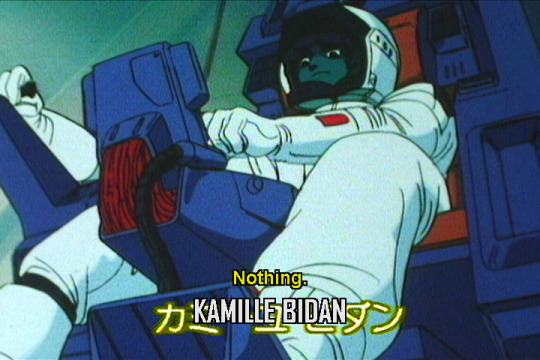
This part of the mobile suit digest extraordinaire was so cute
#i'm pretty sure this bit was narrated by shuichi ikeda and the voice actors for shinta and qum so the mental image is oh so cute#ZZ-1#〇
0 notes
Text

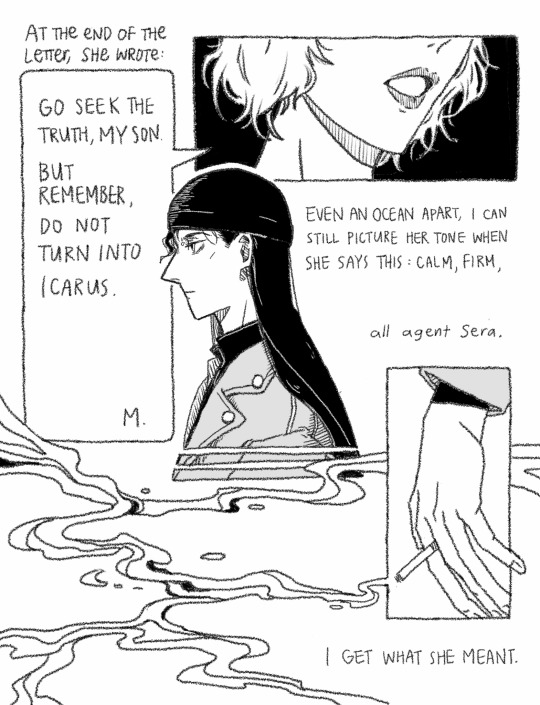


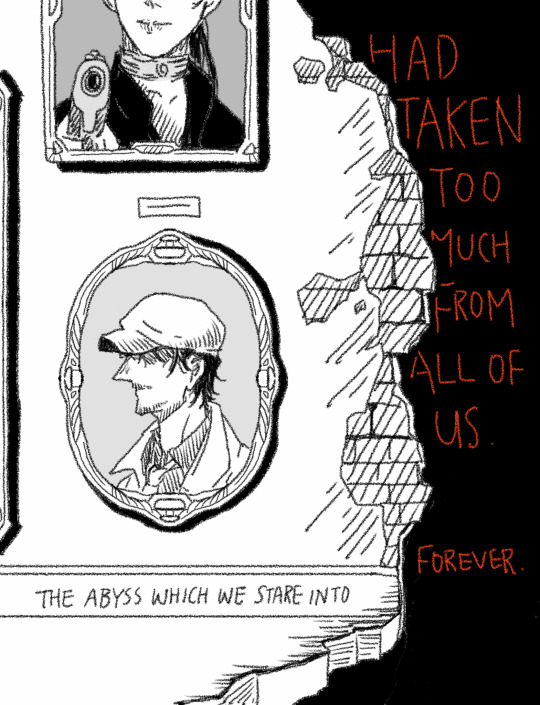




1202
Happy birthday Akai (or something like that happy birthday Ikeda Shuichi sir). Anyway here’s this.
*Anne Sexton: To a Friend Whose Work Has Came to Triumph.

#dcmk#case closed#akai shuichi#detective conan#furuya rei#morofushi hiromitsu#whiskey trio#miyano akemi#illustration#detco
321 notes
·
View notes
Text
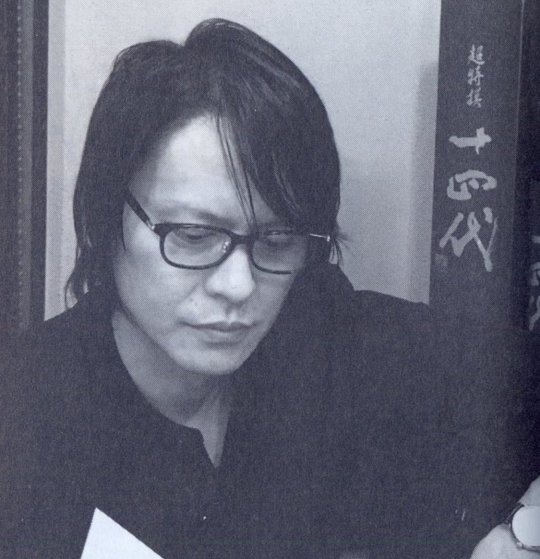
List of books and movies mentioned by Acchan!
Might post an anime version of this soon <3
BOOKS:
仮面の告白 “Confessions of a Mask” by Yukio Mishima (1949)
生きるヒント “Living Tips” by Itsuki Hiroyuki (1993)
斜陽 “The Setting Sun” by Osamu Dazai (1947)
“The Picture of Dorian Gray” by Oscar Wilde (1890)
こころ”Heart” by Natsume Soseki (1914)
“Crime and Punishment” by Fyodor Dostoevsky (1866)
人間失格“No Longer Human” by Osamu Dazai (1948)
死霊“Death Spirits” by Yutaka Haniya (1948)
猫鳴り “Neko Nari” by Numata Mahokaru (2007)
“Coin Locker Babies” by Ryu Murakami (1980)
グロテスク “Grotesque” by Natsuo Kirino (2003)
“Notes from Underground” by Fyodor Dostoevsky (1864)
“The Brothers Karamazov” by Fyodor Dostoevsky (1879-1880)
“Salomé” by Oscar Wilde (1891)
破局 “Catastrophe” by Tono Haruka (2020)
新宿鮫 “Shinjuku Shark” by Arimasa Osawa (1990)
堕落論 “Discourse on Decadence” by Ango Sakaguchi (1946)
五分後の世界 “The World Five Minutes from Now” by Ryu Murakami (1994)
*Manga*悪魔の花嫁 “Bride of Deimos” by Etsuko Ikeda, illust. By Yuuho Ashibe (1974-1990)
九月が永遠に続けば “To Continue Forever in September” by Numata Mahokaru (2005)
彼女がその名を知らない鳥たち “Birds Without Names” by Numata Mahokaru (2006)
銀河鉄道の夜 “Night on the Galactic Railroad” by Kenji Miyazawa (1927)
怒り”Rage” by Shuichi Yoshida (2014)
悪人 “Villain” by Shuichi Yoshida (2007)
MOVIES:
The Green Mile by Frank Darabont (1999)
Bohemian Rhapsody by Bryan Singer (2018)
The Godfather by Francis Ford Coppola (1972)
Pierrot the Fool by Jean-Luc Godard (1965)
The Elephant Man by David Lynch (1980)
老ナルキソス Old Narcissus by Tsuyoshi Shouji (2023)
時計は生きていたThe Clock was Alive by Seijiro Kouyama (1973)
The Mission by Roland Joffé (1986)
Poongsan by Juhn Jai-Hong (2011)
Midnight FM by Kim Sang-man (2010)
Pusher by Nicolas Winding Refn (1996)
Misery by Rob Reiner (1990)
From Paris with Love by Pierre Morel (2010)
異人たちとの夏 The Discarnates by Nobuhiko Obayashi (1988)
Purple Noon by René Clément (1960)
Bonnie and Clyde by Arthur Penn (1967)
狂い咲きサンダーロード Crazy Thunder Road by Gakuryuu Ishii (1980)
Undo by Shunji Iwai (1994)
犬神家の一族 The Inugami Family by Kon Ichikawa (1976)
The Shawshank Redemption by Frank Darabont (1994)
The Brave by Johnny Depp (1997)
Antartica (Nankyoku Monogatari) by Koreyoshi Kurahara (1983)
Here is the link to my actual twitter thread, I update it every time I run into a new book or movie he has mentioned! The information to make this list was taken from several inerviews, radio programs, and even some of the Fish Tank Bulletins. If you know any other book/movie he has mentioned but is not here, do not hesitate to let me know!
ENJOY!
116 notes
·
View notes
Text
Let's Read: A Requiem for Char: The Red Comet of My Youth - Chapter 2
by Shūichi Ikeda
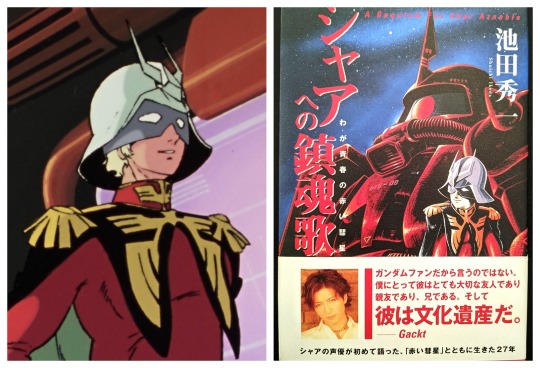
This post will be an overview of the second chapter, And Then I Met “Him”
Here’s a link to a summary of Chapter 1, covering Ikeda’s early acting career.
When we last left off, Ikeda had just auditioned for the role of Amuro Ray, though without much enthusiasm. He recalls wondering if Matsuura had asked him to try out for the role because he had the image of him in Jiro Monogatari in his mind. But regardless, Ikeda was much more interested in the drinking party afterward than anything about the audition.
While waiting for Matsuura to get ready to leave, Ikeda spotted some production materials on the reception room table. Though not particularly interested at first, he remembers flipping through the pages and being immediately drawn in by Yoshikazu Yasuhiko’s character art. And one in particular caught his eye -
Ikeda: Among them, my eyes were glued to the drawing of a certain character, a young officer wearing a mask. He had a different kind of elegance and demeanor than the other characters. When I looked at the illustrations of his facial expressions and standing poses, it inspired me to think, "I wonder if this guy would talk like this," or "I wonder if he would say something like this."
His name, Char Aznable.

Inspired by what he had seen, Ikeda went back to Matsuura and asked if he could record some samples for Char. Though slightly shocked by Ikeda's sudden change of heart, Matsuura agreed.
At the pub later, after a few drinks Matsuura asked him if he'd like to play Char. Ikeda agreed, and Matsuura happily replied "Ok, it's decided!"
Ikeda: Even if I look back on it myself, I think, "It's like a drama," but this is the truth of how I met "him".
The truth, however, was much more complicated. Ikeda didn't know at the time, but another actor had already been lined up for the role. It took some pulling strings behind the scenes by both Matsuura and producer Yasuo Shibue to change things in time for production.
Ikeda: It's all in hindsight, but I always think that some coincidences have fatefully linked me and Char, and that it's the good fortune that I got from the talents and cooperation of various people. It was a truly blessed meeting for both me and Char.
When recording began, Ikeda recounts how immediately he knew Mobile Suit Gundam was something different, even just from the opening narration. His prejudice against robot anime was quickly disappearing.
Ikeda: The scene where Char appears on the TV screen for the first time is a cut where the camera rises from his feet toward Char's face, and the way he appeared was just wonderful and cool. "Who is this guy??" It’s full of charm that draws in the viewer.

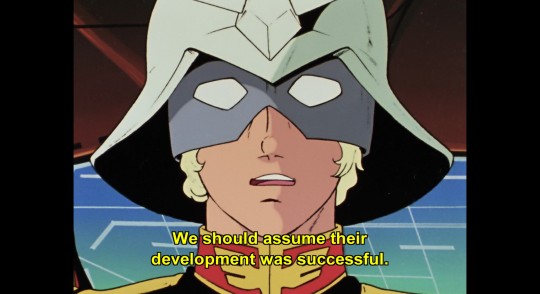
In the studio, each actor's mic was in a specific position. On the left side were those playing characters in the Federation, and the right side, Zeon. Ichirō Nagai, who played Dren, was always sitting next to him.
Ikeda was a fan of Nagai's previous dubbing work and excited to record with him. Just like Char benefited from having a solid military aide like Dren by his side, Ikeda was very grateful to have someone experienced like Nagai with him.
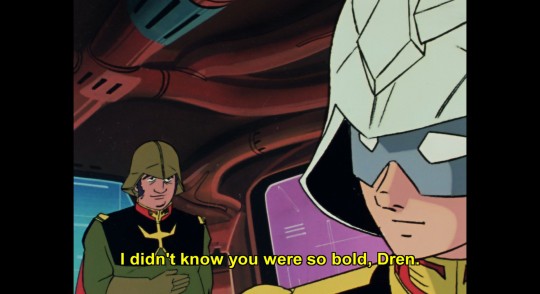
Three months into dubbing, Ikeda already felt he had a pretty good understanding of Char and the direction he wanted to take the character. Neither Matsuura or Director Tomino seemed to have any objections, and Ikeda adds that since Char is such a beloved character even now, perhaps his direction really was the right one.
Much of the focus of this chapter is specific instances from the anime that Ikeda feels highlights one of the strengths of the show as a whole - the drama created by contrasts in each character's personality and temperament, and how they interact with each other.
One of the scenes he notes is Char in the bar listening to Gihren's speech in episode 12.
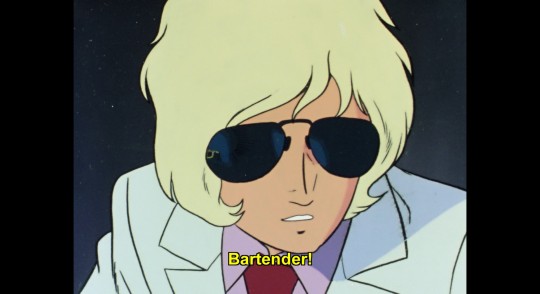
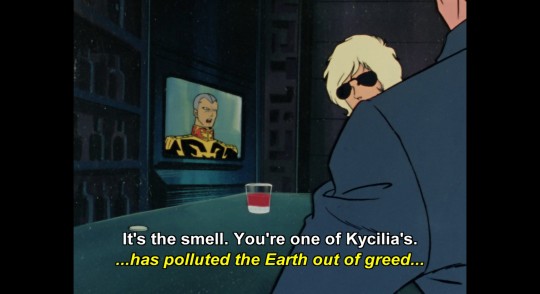
A man approaches, but Char can see through him as a Zeon spy just by the "smell" (atmosphere) he gives off. It's a simple conversation, but Char is able to immediately turn the tables and gain the upper hand. In contrast to Gihren's speech, which is gradually gaining momentum, the two's calm bargaining gives a contrast to the drama.
Another is episode 44, when Lalah asks Char to wear his normal suit while in battle.
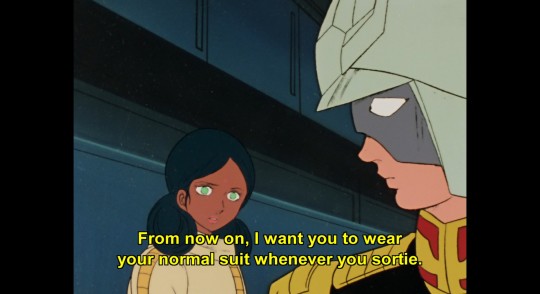

Ikeda: To put it in vulgar terms, it's the same feeling as if your lover who lives with you is telling you, "It looks like it's going to rain today, so take an umbrella with you."
Ikeda: A good sense of warmth flows between the two of them. I tried to create an atmosphere that would make all the men in the world envy them, so I was allowed to play the role with a bit of a wet (softer) touch.
He also notes Char and Sayla's interactions towards the end of the show, specifically in the final episode where Char tells Sayla: "You’re an adult already (too)” (お前ももう大人だろ), the key point here being the “も”, or “too”.
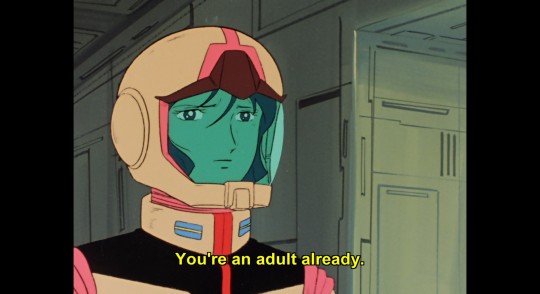
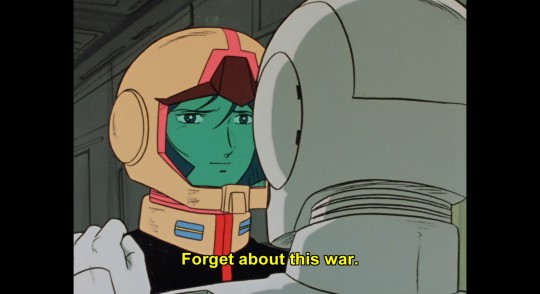

Ikeda: I performed this scene with the intention of expressing that both Artesia and I have grown up, whether we like it or not, and that each of us has our own path to take, and that we can no longer go back to the old days.
Regarding the end of the show itself, interestingly Ikeda expresses some reservations about how Char’s story continued in Zeta and Char's Counterattack. To him, Char’s own war ended the moment he got his final revenge on the Zabi family by shooting Kycilia.
Ikeda: Is Char Aznable the kind of man who would accept a beating from Kamille or start a war in pursuit of Lalah's shadow? He is not the kind of man who would sit back and let his own style be denied to him, but he's more mature and stubborn, isn't he?
Ikeda: In the final scene of the theatrical version of "Mobile Suit Gundam III Encounters in Space", he becomes a crew member of a space battleship and departs from the earth sphere. There could not be a better scene for Char to conclude his story.
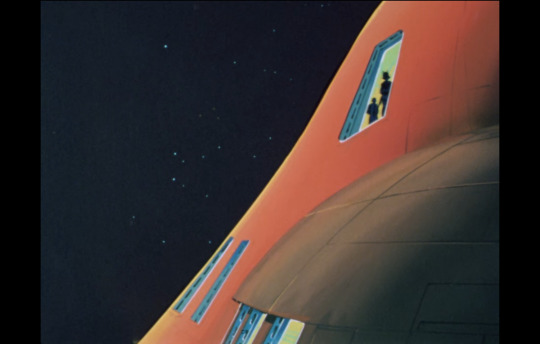

Finally, Ikeda talks about his interactions with Gundam fans at the time.
As the popularity of the anime increased, larger and larger groups of fans would gather outside the studio. The crowds eventually got so bad that the hotel next door started complaining to them. Yet despite the number of people, Ikeda comments on how mature and well behaved these fans were, especially compared to something like idol fans.
Ikeda explains that he’s very careful about how he acts around fans, as he doesn’t want to ruin the image they have of “Char Aznable” as a character. For that reason, he is very particular about choosing public events to attend.

Ikeda: My private life and Char's image are separate, but when I stand in front of my fans, I act with an awareness that I am Char. As a voice actor, this is the minimum courtesy for the fans, and I think it's a matter of pride as a voice actor. At the very least, I hope that the long-time fans who support Char, who I play, will also support my attitude.
~
That's all for Chapter 2. As before, I had to leave quite a bit out in this summary, but I hope you found it interesting to read!
29 notes
·
View notes
Text
Books & B-T
Books/stories that might have inspired B-T lyrics or albums:
Salome by Oscar Wilde Midsummer Night's Dream by Shakespeare Hamlet by Shakespeare Mona Lisa Overdrive by William Gibson Neuromancer by William Gibson Solaris by Stanisław Lem Do Androids Dream of Electric Sheep by Philip K. Dick Alice in Wonderland by Lewis Lewis Carroll Season in Hell Arthur Rimbaud The Stranger by Albert Camus Fantomas by Marcel Allain & Pierre Souvestre Locus Solus by Raymond Roussel Les Enfants Terribles by Jean Cocteau The Fall of Icarus by Ovid Dada Manifesto by Hugo Ball The Surrealist Manifesto by André Breton The Rosicrucian manifestos The Story of Little Black Sambo by Helen Bannerman JoJo's Bizarre Adventure by Hirohiko Araki Hearts by Kumi Himeno The Soul of the Night by Chet Raymo Vita Mechanicalis by Inagaki Taruho Akira by Katsuhiro Otomo
Books mentioned by Acchan:
Villain by Shuichi Yoshida A Collection of Crime Stories by Shuichi Yoshida Ikari by Shuichi Yoshida Kokuhou by Shuichi Yoshida Kokoro by Natsume Soseki Audition by Ryu Murakami Coin Locker Babies by Ryu Murakami The World Five Minutes From Now by Ryu Murakami No Longer Human by Osamu Dazai The Setting Sun by Osamu Dazai Hakyoku by Tono Haruka Kairyou by Tono Haruka Neko Nari by Numata Mahokaru Shibireru by Numata Mahokaru Kugatsu ga Eien ni Tsuzukeba by Numata Mahokaru Yurigokoro by Numata Mahokaru On Decadence by Sakaguchi Ango Confessions of a Mask by Yukio Mishima Death Spirits by Yutaka Haniya Living Tips by Itsuki Hiroyuki Grotesque by Natsuo Kirino Shiki by Fuyumi Ono Bride of Deimos written by Etsuko Ikeda & illustrated by Yuho Ashibe The Flowers of Evil by Charles Baudelaire The Picture of Dorian Gray by Oscar Wilde Crime and Punishment by Fyodor Dostoevsky Notes from the Underground by Fyodor Dostoevsky Night on the Galactic Railroad by Kenji Miyazawa Gedou no uta by Daisuke Watanabe Tokkou no shima by Satō Shūhō
Other authors mentioned by Acchan:
Junji Ito Randi Taguchi Ryunosuke Akutagawa Yasunari Kawabata Natsuhiko Kyogoku Ayatsuji Yukito Sakuraba Kazuki Nobuyuki Fukumoto Hermann Hesse Johann Wolfgang von Goethe
Sources:
nopperabou.net Jrockarchive This is not greatest site Buck-Tick Zone Vk BT group Book list gathered by fans (twt) FT bulletins Ongaku to hito interviews Kurumi chan no Heya (FM COCOLO) B-T profiles through the years I've saved Personal scans & magazines
Feel free to add more books/novels/mangas <3
#i'll update this soon#cause i have more authors but i need to confirm the sources#buck-tick#sakurai atsushi#<3#bt books
106 notes
·
View notes
Text
i can literally hear shuichi ikeda saying halimede in the char voice
8 notes
·
View notes